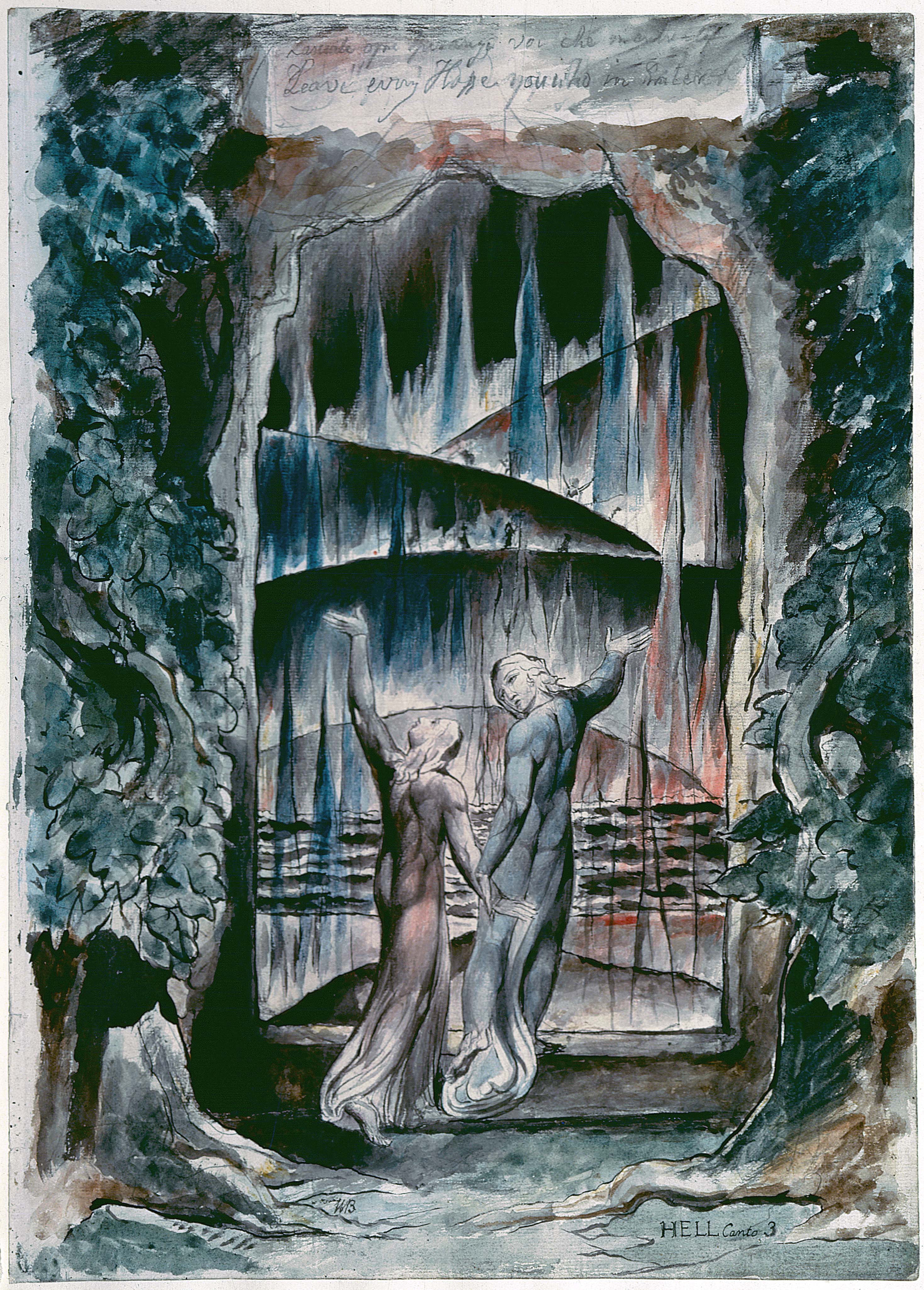 |
| Wikipedia Commons Illustrations to Dante's
Divine
Comedy The Inscription over Hell-Gate |
I've been reading Bob Dylan's Chronicles, Vol 1 searching for similarities between Blake and Dylan. I found that the two men endured many of the same types of experiences and reacted to them in similar ways. The lessons that they learned from experience surfaced in their art. I think that the reason that we are reminded of Blake in Dylan's work is that these two gifted artists shared the same intensity of focus and developed the ability to bring from the depths of their psyches symbolic material.
Dylan presents his development as an artist as pursuing multiple avenues within his chosen field of Folk Music until he discovered his own calling and voice. The intensity with which he followed each style, and the thoroughness with which he mastered the techniques of each of his chosen 'masters' was exhaustive. But imitation was not his goal. With Blake, Dylan could have said:
"I must Create a System, or be enslav'd by another Mans
I will not Reason & Compare: my business is to Create" (Jerusalem)
You might say that Blake and Dylan each reached many dead ends in their lives and began anew. In Blake's writings this scenario was described as being thrown into 'the furnace of affliction', or pursuing error until it could be annihilated. Both men annihilated their error by taking from their experience the 'gold' which had been refined and allowing the 'dross' to be consumed in the fire.
The life scrips of Blake and Dylan were different in many ways but they both were fiercely independent. Neither would allow himself to be defined by the majority culture. Each pursued his art as an avenue to open the minds of men to content which lay buried, but could be accessed for the development of humanity. Each was led to the message he would deliver by his single minded willingness to follow the execution of his art in the direction it was leading him. If neither man was able to maintain the pinnacle of creativity he had reached, there is no fault in that.
Quotes from Chronicles, Volume One by Bob Dylan:
Page 115
"All I'd ever done was sing songs that were dead straight and expressed powerful new realities...I had very little in common with and knew even less about a generation I was supposed to be the voice of...Being true to yourself, that was the thing. I was more a cowpuncher than a Pied Piper."
Page 236
"Folk music was a reality of a more brilliant dimension. It exceeded all human understanding, and it called out to you, you could disappear and be sucked into it. I felt right at home in this mystical realm made up not with individuals so much as archetypes, vividly drawn archetypes of humanity, metaphysical in shape, each rugged and filled with natural knowing and inner wisdom. Each demanding a degree of respect. I could believe in the full spectrum of it and sing about it. It was so real, so more true to life than life itself. It was life magnified. Folk music was all I needed to exist."
Page 292
"The folk music scene had been a paradise I had to leave, like Adam had to leave the garden...The road out there would be treacherous, and I didn't know where it would lead but I followed it anyway. It was a strange world ahead that would unfold, a thunderhead of a world with jagged lightning edges. Many got it wrong and never did get it right. It was wide open. I went straight into it. One thing for sure, not only was it not run by God, but it wasn't run by the devil either."
Page 218
"I would have liked to give him the kind of songs that he wanted, like "Masters of War," "Hard Rain," "Gates of Eden," but those kinds of songs were written under different circumstances, and circumstances never repeat themselves. Not Exactly. I couldn't get to those kinds of songs for him or anyone else. To do it you have to have power and dominion over the spirits. I had done it once, and once was enough. Someone would come along eventually who would have it again - someone who see into things, the truth of things - not metaphorically, either, but really see, like seeing into metal and making it melt, see it for what it was and reveal it for what it was with the hard words and vicious insight."
You can find in Chronicles what you are looking for. What I was seeking was some way that Dylan might be connected to William Blake. I never found that Dylan read Blake or was overtly influenced by Blake's work. What I did find was that the cauldrons in which Blake and Dylan immersed themselves led them to experience life and thought is similar ways. The intensity of focus transformed their minds in such a way that the unconscious archetypal realities came to the surface.
No comments:
Post a Comment